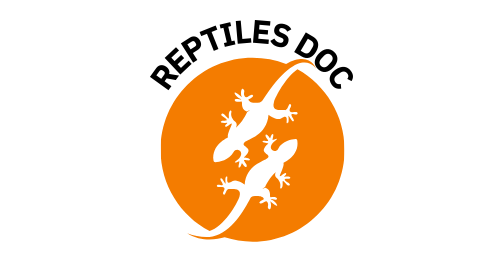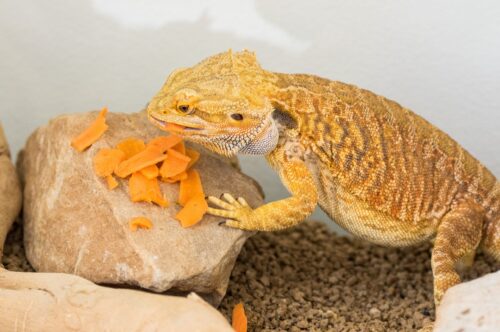Bearded dragons can eat carrots. Carrots are a nutritious vegetable that can be offered to bearded dragons as part of a balanced diet. Can bearded dragons eat carrots? Continue reading to get answers to your question.
Bearded dragons can eat carrots. They are a nutritious addition to their diet, providing vitamins and fiber. However, carrots should be fed in moderation and balanced with other vegetables to ensure a well-rounded diet.However, carrots should be fed in moderation because they are relatively high in oxalates, which can bind to calcium and affect its absorption.
When feeding carrots to your bearded dragon, it’s best to chop them into small, manageable pieces or grate them to avoid choking hazards. Carrots can be given raw or lightly steamed, but raw is often preferred to preserve nutrients. Be sure to include a variety of other vegetables and greens to ensure a well-rounded diet.
Can bearded dragons eat carrots safely?
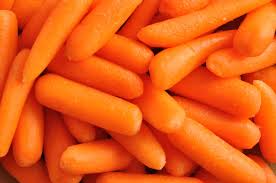
Bearded dragons are omnivorous reptiles that enjoy a varied diet of vegetables, fruits, and insects. As a responsible pet owner, ensuring that your bearded dragon’s diet is both nutritious and safe is essential to their overall health and well-being. Carrots are a common vegetable found in most households, but is it safe for bearded dragons to eat them? This guide explores the safety, benefits, and precautions of feeding carrots to your bearded dragon.
Nutritional Value of Carrots
Carrots are packed with essential vitamins and minerals that can be beneficial to your bearded dragon, including:
- Vitamin A: Carrots are high in beta-carotene, which the body converts to vitamin A. This vitamin is crucial for maintaining healthy vision, skin, and immune function in bearded dragons.
- Fiber: The fiber content in carrots aids in digestion and helps prevent constipation, promoting a healthy digestive system.
- Water Content: Carrots have a high water content, which can help keep your bearded dragon hydrated, especially if they don’t drink water frequently.
Safety and Moderation
While carrots offer several health benefits, they should be fed to bearded dragons in moderation. Here’s why:
- Oxalates: Carrots contain oxalates, which can bind to calcium and reduce its absorption in the body. Over time, excessive consumption of oxalates can lead to calcium deficiency, potentially causing metabolic bone disease in bearded dragons.
- Vitamin A Toxicity: While vitamin A is essential, too much of it can be harmful. Feeding too many vitamin A-rich foods like carrots, especially if your bearded dragon is also receiving vitamin supplements, can lead to hypervitaminosis A, a condition caused by an excess of vitamin A.
How to Feed Carrots Safely
To safely include carrots in your bearded dragon’s diet, follow these guidelines:
- Frequency: Offer carrots occasionally, not as a staple food. They can be part of a varied diet that includes a wide range of vegetables and greens.
- Preparation: Chop carrots into small, manageable pieces or grate them to make them easier for your bearded dragon to eat. You can serve them raw or lightly steamed, but raw is often preferred to retain the maximum nutritional value.
- Balanced Diet: Ensure that carrots are just one component of a diverse diet that includes leafy greens, other vegetables, and a proper balance of insects to provide all the necessary nutrients.
Carrots for bearded dragons health benefits
Bearded dragons are popular pets known for their friendly demeanor and relatively simple care requirements. A crucial aspect of keeping a bearded dragon healthy is providing a balanced and nutritious diet. While insects and leafy greens are staples in their diet, certain vegetables, like carrots, can also play a role. Understanding the health benefits of carrots can help you decide how to incorporate them into your bearded dragon’s diet effectively.
Key Health Benefits of Carrots for Bearded Dragons
Carrots provide several important health benefits for bearded dragons:
- Rich in Vitamin A: Carrots are an excellent source of beta-carotene, a precursor to vitamin A. Vitamin A is crucial for maintaining good vision, skin health, and a robust immune system in bearded dragons. Adequate vitamin A helps prevent issues such as respiratory infections and skin disorders.
- Support Digestive Health: The fiber content in carrots aids in digestion and helps regulate bowel movements. This can be particularly beneficial for bearded dragons, as a diet that supports digestive health helps prevent common issues like constipation.
- Hydration: Carrots have a high water content, which can contribute to keeping your bearded dragon hydrated. This is especially important in arid environments where bearded dragons may not always have access to water or may not drink enough on their own.
- Antioxidant Properties: The antioxidants in carrots, including beta-carotene, help protect cells from damage caused by free radicals. This can support overall health and longevity by reducing the risk of chronic diseases.
Precautions and Balanced Feeding
While carrots are beneficial, they should be fed in moderation:
- Moderation is Key: Despite their benefits, carrots should not be a primary food source. Feeding them occasionally as part of a varied diet ensures your bearded dragon receives a wide range of nutrients without the risks associated with overconsumption.
- Watch for Vitamin A Toxicity: Since carrots are high in vitamin A, it’s important to avoid overfeeding, especially if your bearded dragon is already receiving vitamin A supplements. Excessive vitamin A can lead to hypervitaminosis A, a condition that can cause serious health problems.
- Oxalate Content: Carrots contain oxalates, which can bind with calcium and reduce its absorption in the body. Over time, this can lead to calcium deficiency, so it’s essential to balance carrot intake with other calcium-rich foods.
How to Safely Include Carrots in Their Diet
To safely incorporate carrots into your bearded dragon’s diet:
- Preparation: Cut carrots into small, manageable pieces or grate them to make them easier to eat. This also reduces the risk of choking and ensures your bearded dragon can digest them properly.
- Serving Frequency: Offer carrots as an occasional treat, perhaps once a week, rather than as a daily staple. This allows your bearded dragon to enjoy the benefits of carrots without overconsumption.
- Balance with Other Foods: Ensure that carrots are just one part of a diverse diet that includes leafy greens, other vegetables, and appropriate insects. This variety will help provide all the necessary nutrients for optimal health.
How often can bearded dragons eat carrots?
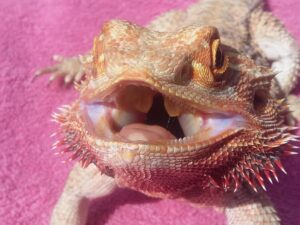
Bearded dragons are fascinating reptiles that require a carefully balanced diet to thrive. Their diet primarily consists of leafy greens, vegetables, fruits, and insects. Among the various vegetables you might consider feeding your bearded dragon, carrots are a popular option due to their nutritional benefits.
However, it’s important to understand how often carrots should be offered to ensure your bearded dragon remains healthy and well-nourished. This guide will provide detailed information on how frequently you can feed carrots to your bearded dragon, along with tips for incorporating them into their diet safely.
Nutritional Benefits of Carrots for Bearded Dragons
Carrots are packed with essential nutrients, including:
- Vitamin A (Beta-Carotene): Carrots are a major source of beta-carotene, which the body converts into vitamin A. This vitamin is crucial for healthy eyesight, skin, and immune function in bearded dragons.
- Fiber: The fiber in carrots helps support digestive health, promoting regular bowel movements and preventing constipation.
- Hydration: Carrots have a high water content, which can contribute to your bearded dragon’s hydration, especially if they are not drinking enough water.
While these benefits make carrots a valuable part of a bearded dragon’s diet, they also highlight the importance of feeding them in appropriate amounts.
How Often Should Bearded Dragons Eat Carrots?
Given the nutritional profile of carrots and the potential risks associated with overfeeding, here’s how often you can safely include carrots in your bearded dragon’s diet:
- Frequency: Carrots should be offered to your bearded dragon once or twice a week. This allows your pet to enjoy the nutritional benefits without overexposing them to high levels of vitamin A and oxalates, which can interfere with calcium absorption.
- Portion Size: When you do offer carrots, ensure the portion is small, making up a minor part of the overall meal. This can be a few small pieces or grated carrots mixed with other vegetables.
Risks of Overfeeding Carrots
While carrots are nutritious, overfeeding can lead to certain health issues:
- Vitamin A Toxicity: Carrots are high in beta-carotene, which can lead to an excess of vitamin A if consumed in large quantities, especially when combined with other vitamin A-rich foods or supplements. Vitamin A toxicity, or hypervitaminosis A, can cause symptoms such as swelling, lethargy, and even organ damage.
- Calcium Absorption Issues: Carrots contain oxalates, which can bind to calcium and reduce its absorption in the body. Over time, this can contribute to calcium deficiency, potentially leading to metabolic bone disease, a serious condition that affects the skeletal health of bearded dragons.
Tips for Feeding Carrots Safely
To safely include carrots in your bearded dragon’s diet:
- Variety is Key: Make sure carrots are just one of many vegetables in your bearded dragon’s diet. Leafy greens like collard greens, mustard greens, and dandelion greens should make up the bulk of their vegetable intake.
- Balanced Diet: In addition to vegetables, your bearded dragon’s diet should include insects and occasional fruits to ensure a well-rounded nutritional profile.
- Monitor Health: Keep an eye on your bearded dragon’s overall health and behavior. If you notice any signs of vitamin A toxicity or calcium deficiency, consult a veterinarian.
Are carrots safe for bearded dragons
Bearded dragons, known for their friendly nature and manageable care requirements, require a balanced diet to stay healthy. Their diet typically consists of insects, leafy greens, and a variety of vegetables. Carrots, a common vegetable in many households, often raise questions among bearded dragon owners regarding their safety and nutritional benefits.
This guide provides a detailed analysis of whether carrots are safe for bearded dragons, considering their nutritional value, potential risks, and best practices for feeding.
Nutritional Profile of Carrots
Carrots offer several nutrients that can be beneficial for bearded dragons, including:
- Vitamin A (Beta-Carotene): Carrots are an excellent source of beta-carotene, which the body converts into vitamin A. Vitamin A is essential for maintaining good vision, skin health, and a strong immune system in bearded dragons.
- Fiber: The fiber content in carrots supports digestive health, aiding in regular bowel movements and preventing constipation.
- Water Content: Carrots have a high water content, which helps keep your bearded dragon hydrated, particularly if they are not frequent water drinkers.
These nutritional elements make carrots a potentially beneficial addition to your bearded dragon’s diet when fed correctly.
Are Carrots Safe for Bearded Dragons?
Carrots are generally safe for bearded dragons to eat, but there are important considerations to keep in mind:
- Moderation is Key: While carrots can be a healthy part of your bearded dragon’s diet, they should not be the primary vegetable. Feeding carrots in moderation once or twice a week is recommended to avoid potential health issues.
- Risk of Vitamin A Toxicity: Carrots are high in beta-carotene, which converts to vitamin A. Overfeeding carrots, especially in combination with vitamin A supplements or other vitamin A-rich foods, can lead to hypervitaminosis A, a condition caused by excessive vitamin A. Symptoms of vitamin A toxicity include lethargy, swelling, and skin issues.
- Calcium Absorption: Carrots contain oxalates, compounds that can bind with calcium and inhibit its absorption in the body. This can potentially lead to calcium deficiency over time, increasing the risk of metabolic bone disease, a serious condition in reptiles.
How to Safely Feed Carrots to Your Bearded Dragon
To ensure that carrots are a safe and beneficial part of your bearded dragon’s diet, follow these guidelines:
- Serve in Moderation: Limit carrot intake to small amounts once or twice a week. This helps prevent overconsumption of vitamin A and oxalates.
- Preparation: Cut carrots into small, manageable pieces or grate them to make them easier for your bearded dragon to eat. This also helps prevent choking and ensures the food is easily digestible.
- Balance with Other Foods: Make sure carrots are just one component of a varied diet. Include plenty of leafy greens like collard greens, mustard greens, and other vegetables, as well as a good source of protein from insects like crickets or dubia roaches.
- Monitor Health: Regularly monitor your bearded dragon for any signs of health issues, such as changes in behavior, appetite, or physical appearance. If you notice any concerns, consult a veterinarian.
Feeding carrots to bearded dragons
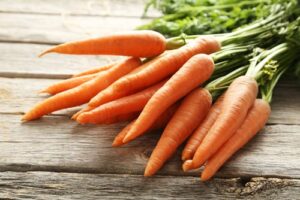
Bearded dragons are well-known for their varied diet, which includes a mix of vegetables, fruits, and insects. As a pet owner, you may want to offer your bearded dragon a diverse range of foods to ensure they receive a balanced diet.
Carrots are a popular vegetable that many owners consider including in their bearded dragon’s diet. However, it’s important to understand the nutritional benefits, potential risks, and best practices for feeding carrots to ensure they contribute positively to your pet’s health.
Nutritional Benefits of Carrots
Carrots offer several key nutrients that can be beneficial for bearded dragons:
- Vitamin A (Beta-Carotene): Carrots are rich in beta-carotene, which is converted into vitamin A in the body. Vitamin A is essential for maintaining healthy vision, skin, and immune function. It supports overall health and helps prevent various health issues.
- Fiber: Carrots contain dietary fiber, which aids in digestion and helps maintain regular bowel movements. Proper digestion is crucial for nutrient absorption and overall gut health.
- Water Content: Carrots have a high water content, which can help keep your bearded dragon hydrated, especially if they are not drinking enough water on their own.
Risks and Considerations
While carrots have many benefits, there are also some risks associated with their consumption:
- Vitamin A Toxicity: Carrots are high in beta-carotene, which can lead to excessive vitamin A levels if fed in large amounts or in combination with other vitamin A-rich foods or supplements. Symptoms of vitamin A toxicity include lethargy, swelling, and skin issues. It’s important to avoid overfeeding and ensure a balanced intake of vitamin A.
- Oxalates: Carrots contain oxalates, which can bind to calcium and reduce its absorption in the body. Over time, high oxalate consumption can contribute to calcium deficiency and metabolic bone disease, a serious condition affecting bone health.
Best Practices for Feeding Carrots
To safely incorporate carrots into your bearded dragon’s diet, follow these guidelines:
- Moderation: Feed carrots in moderation, ideally once or twice a week. This helps to ensure that they contribute to a balanced diet without causing potential health issues related to excessive vitamin A or oxalates.
- Preparation: Prepare carrots by chopping them into small, manageable pieces or grating them. This makes them easier for your bearded dragon to eat and digest, reducing the risk of choking and ensuring proper nutrient absorption.
- Varied Diet: Use carrots as part of a varied diet. Bearded dragons should primarily consume leafy greens, other vegetables, and appropriate insects. A balanced diet ensures that your pet receives a full range of nutrients necessary for their health.
- Monitor Health: Observe your bearded dragon for any signs of health issues or adverse reactions after introducing new foods. Regular monitoring helps ensure that your pet remains healthy and well-nourished.
Nutritional value of carrots for bearded dragons
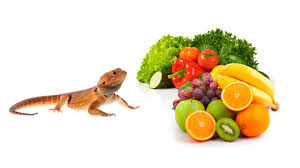
Bearded dragons are versatile eaters, enjoying a diverse diet that includes vegetables, fruits, and insects. Carrots, a popular vegetable, are often considered a good option to include in their diet.
Nutritional Components of Carrots
Carrots are rich in several key nutrients that can be beneficial for bearded dragons:
- Beta-Carotene (Vitamin A Precursor): Carrots are one of the best sources of beta-carotene, which the body converts into vitamin A. Vitamin A is crucial for maintaining healthy vision, skin, and immune function. Adequate levels of vitamin A support overall health and help prevent various health issues.
- Vitamin C: Carrots contain a modest amount of vitamin C, an antioxidant that supports immune function and overall health. While not as abundant as in some other vegetables and fruits, vitamin C can still contribute to a balanced diet.
- Fiber: Carrots are a good source of dietary fiber, which aids in digestion and promotes regular bowel movements. Proper fiber intake supports gut health and helps prevent constipation.
- Potassium: Carrots contain potassium, a mineral that helps regulate fluid balance, muscle function, and nerve signaling. Adequate potassium levels are important for maintaining overall health.
- Calcium: Although carrots contain some calcium, they are not a significant source compared to other vegetables. However, they can still contribute to the overall calcium intake in your bearded dragon’s diet.
- Water Content: Carrots have a high water content, which helps with hydration. This is particularly beneficial for bearded dragons that may not drink water frequently.
Benefits of Carrots for Bearded Dragons
The nutritional components of carrots can offer several benefits for bearded dragons:
- Support for Vision and Skin Health: The high beta-carotene content in carrots, converted to vitamin A, supports good vision and maintains healthy skin and mucous membranes. This is crucial for overall well-being and disease prevention.
- Improved Digestion: The dietary fiber in carrots aids in digestion and helps ensure regular bowel movements, reducing the risk of digestive issues such as constipation.
- Hydration: Carrots’ water content can contribute to your bearded dragon’s hydration, especially if they are not drinking enough water.
Considerations and Risks
While carrots have beneficial nutrients, there are some considerations to keep in mind:
- Vitamin A Toxicity: Excessive vitamin A intake can lead to toxicity. Although carrots are a good source of beta-carotene, it’s important to avoid overfeeding and ensure that carrots are only a small part of a varied diet.
- Oxalates: Carrots contain oxalates, which can bind to calcium and reduce its absorption. High oxalate consumption can lead to calcium deficiency over time if not balanced with other calcium-rich foods.
Best Practices for Feeding Carrots
- Moderation: Feed carrots in small amounts and not as a daily staple. Aim for once or twice a week to provide nutritional benefits without overloading on any particular nutrient.
- Preparation: Chop carrots into small, manageable pieces or grate them to ensure they are easy to eat and digest. This reduces the risk of choking and aids in nutrient absorption.
- Balanced Diet: Incorporate carrots into a varied diet that includes other vegetables, leafy greens, and protein sources to ensure a well-rounded nutritional profile.
Carrot treats for bearded dragons
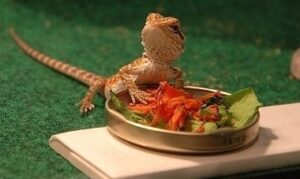
Bearded dragons are omnivorous reptiles that enjoy a varied diet, including a mix of vegetables, fruits, and insects. Carrots, with their vibrant color and crunchy texture, can be a delightful and nutritious treat for these reptiles.
However, understanding how to properly prepare and serve carrots as treats is crucial for maintaining your bearded dragon’s health.
Nutritional Benefits of Carrot Treats
Carrots offer several nutritional benefits that can be advantageous for bearded dragons when fed as treats:
- Vitamin A: Carrots are rich in beta-carotene, which the body converts into vitamin A. This vitamin supports healthy vision, skin, and immune function, contributing to overall health.
- Fiber: The fiber in carrots aids in digestion and helps maintain regular bowel movements. Proper fiber intake supports gut health and can prevent constipation.
- Hydration: Carrots have a high water content, which helps keep your bearded dragon hydrated. This is particularly beneficial if they are not consuming enough water on their own.
Best Practices for Preparing Carrot Treats
To safely incorporate carrot treats into your bearded dragon’s diet, follow these guidelines:
- Preparation:
- Size and Shape: Cut carrots into small, manageable pieces or grate them. Small, bite-sized pieces are easier for your bearded dragon to eat and digest.
- Cooking: While raw carrots are generally safe, you can lightly steam them to make them easier to digest. Avoid adding any seasoning or oils.
- Serving Frequency:
- Moderation: Offer carrot treats sparingly, ideally once or twice a week. Carrots should complement a balanced diet that includes a variety of other vegetables, leafy greens, and protein sources.
- Portion Size: Limit the amount of carrots to a small portion to prevent overconsumption of vitamin A and oxalates.
- Variety:
- Balanced Diet: Carrots should be just one component of a varied diet. Ensure your bearded dragon also receives other vegetables, leafy greens, and appropriate insect protein to meet their nutritional needs.
Potential Risks and Considerations
While carrots can be a nutritious treat, there are some risks to consider:
- Vitamin A Toxicity: Overfeeding carrots or other vitamin A-rich foods can lead to excessive vitamin A levels, potentially causing toxicity. Symptoms of vitamin A toxicity include swelling, lethargy, and skin issues.
- Oxalates: Carrots contain oxalates, which can bind to calcium and reduce its absorption. High oxalate consumption can contribute to calcium deficiency and metabolic bone disease if not balanced with other calcium-rich foods.
Tips for Safe Carrot Treats
To ensure carrot treats are beneficial and safe for your bearded dragon:
- Monitor Health: Observe your bearded dragon for any signs of health issues or adverse reactions after introducing new treats. Regular monitoring helps ensure they remain healthy and well-nourished.
- Mix with Other Foods: Combine carrot treats with other vegetables and greens to provide a balanced nutritional profile. This helps prevent any negative effects from overconsumption of a single type of food.
- Consult a Vet: If you have any concerns about your bearded dragon’s diet or health, consult with a veterinarian experienced with reptiles.
Raw or cooked carrots for bearded dragons
Bearded dragons are known for their diverse diet, which includes a mix of vegetables, fruits, and protein sources. Carrots, a popular and nutritious vegetable, can be included in their diet. However, when it comes to feeding carrots to bearded dragons, you might wonder whether raw or cooked carrots are the better option.
Nutritional Comparison: Raw vs. Cooked Carrots
Raw Carrots:
- Nutrient Preservation: Raw carrots retain most of their natural vitamins and minerals, including vitamin A (in the form of beta-carotene) and fiber. The water content is also preserved in raw carrots.
- Digestibility: Raw carrots are crunchy and may be more challenging for some bearded dragons to chew and digest. For younger or smaller bearded dragons, raw carrots should be finely chopped or grated to prevent choking and aid digestion.
- Enzymes and Antioxidants: Raw carrots contain natural enzymes and antioxidants that can be beneficial for overall health.
Cooked Carrots:
- Digestibility: Cooking carrots, such as by steaming, can soften them, making them easier for bearded dragons to chew and digest. This can be particularly helpful for older dragons or those with dental issues.
- Nutrient Availability: Cooking can increase the availability of certain nutrients, such as beta-carotene, by breaking down the cell walls of the carrots. However, some heat-sensitive vitamins and minerals may be reduced during cooking.
- Preparation: Cooked carrots should be prepared without any added seasonings or oils. Lightly steaming is recommended as it helps retain most of the nutrients while softening the carrots.
Best Practices for Feeding Carrots
- Raw Carrots:
- Preparation: Slice raw carrots into small, manageable pieces or grate them to make them easier for your bearded dragon to consume. This reduces the risk of choking and aids digestion.
- Serving: Offer raw carrots occasionally, in moderation, to avoid overconsumption of vitamin A and to ensure a varied diet.
- Cooked Carrots:
- Preparation: Steam carrots lightly until they are tender. Avoid adding any salt, oils, or seasonings. Cut the cooked carrots into small pieces or mash them to ensure they are easy to eat.
- Serving: Include cooked carrots as an occasional treat or part of a varied diet. Monitor your bearded dragon to ensure they are eating and digesting the cooked carrots well.
Considerations for Feeding Carrots
- Moderation: Whether raw or cooked, carrots should be fed in moderation. Excessive carrot consumption can lead to potential issues such as vitamin A toxicity or calcium absorption problems due to the oxalates present in carrots.
- Varied Diet: Carrots should be part of a balanced diet that includes a variety of vegetables, leafy greens, and protein sources. This ensures that your bearded dragon receives all the necessary nutrients for optimal health.
- Observation: Monitor your bearded dragon’s health and behavior after introducing new foods. This helps identify any potential issues related to diet changes.
Can baby bearded dragons eat carrots
Baby bearded dragons, or hatchlings, have specific dietary needs that differ from those of adults. As they grow, their dietary requirements evolve, and introducing various foods is crucial for their development. Carrots, a nutrient-rich vegetable, are often considered for inclusion in a bearded dragon’s diet.
However, it’s important to understand whether carrots are suitable for baby bearded dragons and how to prepare them properly to ensure their health and well-being.
Nutritional Benefits of Carrots for Baby Bearded Dragons
Carrots offer several key nutrients that can be beneficial for bearded dragons, including babies:
- Vitamin A: Carrots are rich in beta-carotene, which converts to vitamin A. Vitamin A supports healthy vision, skin, and immune function, which are crucial for the overall development of baby bearded dragons.
- Fiber: The fiber in carrots aids in digestion and helps maintain regular bowel movements. Proper digestion is essential for nutrient absorption and overall gut health.
- Hydration: Carrots have a high water content, which can contribute to hydration, especially important for young bearded dragons that may not drink water frequently.
Risks and Considerations
While carrots provide nutritional benefits, there are specific considerations for baby bearded dragons:
- Size and Texture: Carrots are quite firm and crunchy. For baby bearded dragons, the texture and size can be challenging. Large or hard pieces can pose a choking hazard. Carrots should be finely grated or chopped into very small pieces to reduce the risk.
- Nutrient Balance: Baby bearded dragons require a balanced diet with a focus on protein and calcium. Carrots, while nutritious, should not be the primary food. Over-reliance on carrots or other vegetables can lead to imbalances in their diet.
- Vitamin A Toxicity: Excessive vitamin A intake can lead to toxicity. While carrots are a good source of beta-carotene, it’s important to offer them in moderation and ensure a varied diet.
Best Practices for Feeding Carrots to Baby Bearded Dragons
- Preparation:
- Size: Grate or finely chop carrots into tiny pieces to ensure they are easy for baby bearded dragons to eat and digest. Avoid serving whole or large chunks.
- Cooking: Lightly steaming carrots can make them softer and easier to digest. Ensure that they are cooled and cut into small pieces before offering them.
- Moderation:
- Frequency: Introduce carrots gradually and offer them only as an occasional treat. They should not replace the main protein and calcium-rich foods that baby bearded dragons need.
- Portion Size: Serve small amounts to avoid overconsumption. Carrots should be just one part of a varied diet.
- Balanced Diet:
- Variety: Ensure that baby bearded dragons receive a balanced diet that includes a mix of protein (e.g., insects), leafy greens, and other vegetables. This ensures they get all the essential nutrients for healthy growth and development.
- Monitor Health:
- Observation: Watch your baby bearded dragon for any signs of health issues or digestive problems after introducing new foods. Adjust their diet based on their reactions and health status.
Vegetables bearded dragons can eat
Bearded dragons are omnivorous reptiles with diverse dietary needs, which include a variety of vegetables to ensure a balanced and nutritious diet. Offering a range of vegetables not only provides essential vitamins and minerals but also adds variety and enrichment to their diet.
Understanding which vegetables are safe and beneficial for bearded dragons, how to prepare them, and how to incorporate them into their diet can help maintain their health and well-being.
Safe Vegetables for Bearded Dragons
Here is a detailed list of vegetables that are safe and beneficial for bearded dragons, along with their nutritional benefits:
- Collard Greens
- Nutritional Benefits: High in calcium, vitamins A and C, and fiber. Supports bone health and immune function.
- Preparation: Chop finely or shred to make it easier for bearded dragons to consume.
- Mustard Greens
- Nutritional Benefits: Rich in calcium, vitamin A, and fiber. Supports digestive health and bone development.
- Preparation: Wash thoroughly and chop into small pieces.
- Kale
- Nutritional Benefits: Contains vitamins A, C, and K, along with calcium and antioxidants. Supports overall health.
- Preparation: Chop into small, manageable pieces and avoid overfeeding due to high calcium levels.
- Turnip Greens
- Nutritional Benefits: Good source of calcium, vitamins A and C. Supports bone health and immune function.
- Preparation: Wash well and chop into small pieces.
- Carrots
- Nutritional Benefits: High in beta-carotene (vitamin A), fiber, and water. Supports vision and digestive health.
- Preparation: Grate or finely chop; offer in moderation due to high vitamin A content.
- Bell Peppers
- Nutritional Benefits: Rich in vitamins A, C, and antioxidants. Supports immune health and overall vitality.
- Preparation: Remove seeds and chop into small pieces.
- Squash (e.g., butternut, acorn)
- Nutritional Benefits: Contains vitamins A and C, fiber, and potassium. Supports digestion and overall health.
- Preparation: Cook lightly to soften and chop into small pieces.
- Zucchini
- Nutritional Benefits: Provides vitamins A and C, and is low in oxalates. Supports hydration and digestive health.
- Preparation: Chop into small pieces; can be served raw or lightly steamed.
- Cucumber
- Nutritional Benefits: High water content for hydration and contains vitamins A and C. Supports overall hydration.
- Preparation: Peel and chop into small pieces.
- Beet Greens
- Nutritional Benefits: Contains vitamins A and C, calcium, and antioxidants. Supports overall health.
- Preparation: Wash thoroughly and chop into small pieces.
Best Practices for Feeding Vegetables
- Variety:
- Balanced Diet: Offer a variety of vegetables to ensure your bearded dragon receives a range of nutrients. Avoid relying on a single vegetable as the primary food source.
- Preparation:
- Size: Chop vegetables into small, bite-sized pieces or shred them to ensure they are easy for your bearded dragon to eat and digest.
- Cleaning: Wash all vegetables thoroughly to remove any pesticides or contaminants.
- Serving:
- Frequency: Include vegetables in your bearded dragon’s diet daily or every other day, alongside other foods such as insects and leafy greens.
- Portion Size: Offer a balanced portion of vegetables, and monitor their intake to avoid overfeeding.
- Avoid Certain Vegetables:
- High Oxalate Vegetables: Some vegetables, such as spinach and Swiss chard, are high in oxalates and can interfere with calcium absorption. These should be fed sparingly, if at all.
- High Phosphorus Vegetables: Vegetables with high phosphorus content should also be limited to avoid imbalances in calcium and phosphorus ratios.
Bearded dragons and carrot consumption
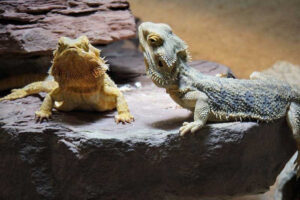
Carrots are a common vegetable that many pet owners consider including in their bearded dragon’s diet. These vibrant orange vegetables are known for their nutritional benefits and crunchy texture.
However, while carrots can be a healthy addition, it’s important to understand how they fit into a bearded dragon’s diet, how to prepare them properly, and what considerations to keep in mind to ensure your pet’s well-being.
Nutritional Benefits of Carrots for Bearded Dragons
- Vitamin A:
- Beta-Carotene: Carrots are an excellent source of beta-carotene, which converts to vitamin A in the body. Vitamin A supports healthy vision, skin, and immune function. It is particularly important for the overall health and development of bearded dragons.
- Fiber:
- Digestive Health: Carrots contain dietary fiber that helps in maintaining healthy digestion and regular bowel movements. Fiber is essential for preventing constipation and promoting gut health.
- Hydration:
- Water Content: Carrots have a high water content that contributes to hydration. This is beneficial for bearded dragons, especially if they are not drinking water frequently.
Best Practices for Feeding Carrots to Bearded Dragons
- Preparation:
- Size and Texture: Carrots should be cut into small, manageable pieces or finely grated to make them easier for bearded dragons to eat. This helps prevent choking and aids in digestion.
- Cooking: While raw carrots can be offered, lightly steaming them can make them softer and easier to digest. Ensure that cooked carrots are cooled before serving.
- Serving Frequency:
- Moderation: Carrots should be offered as an occasional treat, not as a staple food. Due to their high vitamin A content, feeding carrots too frequently can lead to vitamin A toxicity. A balanced diet that includes a variety of vegetables, leafy greens, and protein sources is crucial.
- Balancing the Diet:
- Variety: Include a mix of vegetables and other food items in your bearded dragon’s diet. This prevents over-reliance on any single food item and ensures a well-rounded intake of nutrients.
- Monitoring Health:
- Observation: Keep an eye on your bearded dragon’s health and behavior after introducing new foods. Look for any signs of digestive issues or health problems that may arise from dietary changes.
Potential Risks and Considerations
- Vitamin A Toxicity:
- Overconsumption: Excessive intake of vitamin A can lead to toxicity, characterized by symptoms such as swelling, lethargy, and skin issues. It’s important to offer carrots in moderation and balance them with other foods.
- Oxalates:
- Calcium Absorption: Carrots contain oxalates, which can bind to calcium and reduce its absorption. This can potentially lead to calcium deficiency if not balanced with other calcium-rich foods.
- Nutritional Imbalance:
- Dietary Balance: Carrots should not replace the essential protein and calcium sources that bearded dragons need. Ensure that their diet remains diverse and nutritionally balanced.
Conclusion
Carrots can be a valuable addition to a bearded dragon’s diet, providing important nutrients like vitamin A, fiber, and hydration. Can bearded dragons eat carrots? Bearded dragons can eat carrots in moderation.
Carrots provide vitamins and fiber but should be chopped or grated to prevent choking. Due to their high vitamin A content, they should be served occasionally and balanced with other vegetables to avoid overconsumption and potential toxicity.
When included in moderation and prepared appropriately, carrots can support digestive health and overall well being. However, it is essential to balance their intake with other foods and monitor your bearded dragon’s health to avoid potential issues such as vitamin A toxicity and calcium deficiency.
